- Home
- Anna Kavan
The Parson (Peter Owen Modern Classic) Page 5
The Parson (Peter Owen Modern Classic) Read online
Page 5
He’d already considered the matter, knowing he would be left with the animal on his hands, and had decided that Coffee should stay at his home, where there were stables and paddocks unused since his father’s time. Now he forgot his troubled preoccupations, trying to explain that, once a pony had been trained and ridden, it couldn’t go back happily to its wild state; that it wouldn’t know how to forage for itself, and would be ostracized by its former companions, because it bore the smell of servitude, which they hated.
Needless to say, he was wasting his time; Rejane refused to listen. In her head was the romantic picture of Coffee flying off to the wilds, free as air – nothing could change it. Oswald didn’t want to oppose her, and felt unequal even to the attempt. It occurred to him that Coffee would probably be forgotten, anyhow, in the excitement of her departure.
*
Superficially, calm and friendliness were restored. But neither of them had much to say, and, by mutual consent, they started back to The Hope Deferred earlier than they usually did.
To Rejane the moors were already unreal, outside the reality of her own world. The great pale waste, its purple and gold extinguished, looked phantasmal to her, huge and lonely, with the hummocks of distant tors hunched on the horizon. She’d had more than enough of it, and didn’t want to look.
However, the ponies having plodded and scrambled up a long rise, she was confronted by the steep slope down to the valley, floating below in the last luminous light of the sunset, with its farms in their trees, water flashing bright in the folds of the moor beyond. The little lost valley caught her eye for a moment with its gemlike delicacy and brilliant clearness, in miniature there. It had the fragile look of something about to vanish, the almost-bare trees ghostly looking in their few yellow leaves. At ground level, dusk was already thickening, while the treetops still shimmered ghostlike in sunset gold. Suddenly, as she looked, the valley sank out of sight, all its toylike brightness put out as the sun disappeared and the lumpish tors heaved themselves up all round it in startling significance, huge and uncanny, the gloomy dark masses of moorland standing out menacingly.
Suddenly then, at this first moment after the sun had set, she shivered, feeling frost in the air. The cold seemed to leap upon her like some wild animal. She had a brief moment of superstitious fear, feeling for the first time the power of the hostile north, feeling this country as her enemy – she wouldn’t be really safe from it until she was on the ship. Her one desire now was to get away. She had a positive craving for the noise and bustle of cities after the silence and emptiness of the north – if only she could be gone, and all this left far behind and forgotten!
Now up came Oswald to ride at her side, a bit subdued, but protective as ever in his knight-errant way, to guard her from her own superstitious fears. Odd how he always seemed to sense what she was feeling.
‘Chilly?’ He now put out a comforting, helpful hand, to turn up her coat collar. Then, evidently thinking that conversation was called for, he began telling her about the ancient castle fortress of Bannenberg, to which the old halflegendary kings were supposed to have gone, after receiving magical warning of their approaching end. An echo of his musical lilt could be heard; but his brilliant eyes brooded over her, filled with melancholy and misgiving. She got the impression that he was talking to reassure himself almost as much as her.
And, being sensitized just then, whether she liked it or not, to northern influences, she had an instantaneous impersonal vision of him as a man bom to a certain tradition of nobility and honourable service, now lost to the world. Finding no one and nothing to serve with the nobility in him, he was rejected, left isolated and unfulfilled. He’d dedicated his knightly service to her; that was why his need for contact with her was so urgent. It was more than being in love with her – something more compelling. His life, almost, depended on loving her. She alone could save him from being rejected, cast out.
All this she saw in an instantaneous flash, as if from outside herself, immediately afterwards thinking, from inside. Why couldn’t he save himself? Why should he expect her to save him? It seemed presumptuous, as if he were making use of her as a means to an end. At the same time, she was gratified because at last she possessed his secret; which meant that the man himself was no longer in the least interesting – anyhow, she’d finished with him already as she had with everything here. She was about to send Coffee cantering on, leaving Oswald behind, when she changed her mind, and continued to ride beside him.
She’d never been to Bannenberg, or wanted to go, always avoiding the places that tourists went to. But now she suddenly said she must see the final resting-place of the old kings before she left the country – it would make a suitable expedition for her last day here.
Oswald had already planned in his head a sentimental tour of their favourite places, hoping they might have a softening effect at the end, and at once started protesting. Bannenberg was much too far for the ponies; even by car they could only just get there and back in one day. And wouldn’t she have a lot to do then? Surely she wouldn’t want to spend the whole day in the car? What about her packing?
No longer susceptible to the north or its influences, she cared nothing for the horrible country, simply regarding it with extreme repugnance. But she had her reasons for wanting to go on this trip, and was quite determined.
They came down to the little cluster of dwellings, which seemed huddled together as if for warmth in the dismal twilight. And, the whole length of the village street, Oswald continued his argument: it was too late in the season for Bannenberg, which could be approached only by a lonely coast road, liable at this time of the equinoctial gales to be swept by high tides and rendered impassable. Only a year ago a section of the cliff had collapsed, and with it part of the castle, carried away by the rough seas that incessantly battered the wild, exposed coastline.
Rejane was hardly listening, he hardly seemed real. Only, occasionally, in the dusk, her eye caught the ghostly white gleam of his hair, falling forward as he leaned towards her, talking with spectral emphasis and persistence; till at last, to her relief, the lights of The Hope Deferred came in sight. Its bright windows looked hospitable and cheerful; it seemed the one point of life and light in all that dreary cold desolation.
With a charming smile for the youth who ran out to take Coffee’s bridle, she slid from the saddle and hurried in, into the warm; Oswald, like winter personified with his white head, closely pursuing.
*
Now, under the lights, he could see the inflexible look he’d known all the time must be on her face, against which no words or actions of his could prevail. But, obsessed, he insisted on finding an atlas and showing her Bannenberg, the northernmost headland of his northern country, like a signpost, pointing straight to the Pole.
Holding out her hands to the pile of logs blazing in the wide fireplace, Rejane gave the map a perfunctory glance. And, in spite of the heat of the fire, she suddenly shivered again, as she had on the moor, feeling the hostility of the frozen north, exclaiming, ‘Heavens, how cold it is tonight!’
Always obliging, Oswald hastily threw on some more logs without being distracted from his argument. While swarms of sparks fled up the chimney, he told her that the castle was already considered unsafe; tourists were warned that they went there at their own risk – one of these days the whole ancient edifice would sink under the waves, ceaselessly eroding its foundations.
All the more reason, Rejane lightly answered, for her to see it while this was still possible. Her momentary chill forgotten, she stood in the firelight, smiling and adamant, not to be deflected from her purpose, which was no mere whim but a calculated design: by keeping him fully occupied throughout her last day, she would prevent any inconvenient display of emotion.
The young man was confused by the contrast between her outward serenity and good humour, and the emanation he felt of something ruthless opposing him from within her, demolishing each objection he raised, a radiation of implacable will, whi
ch crushed all his protests stone dead, finally crushing him too and forcing him to surrender.
As if she’d been waiting just for this, as soon as he’d given in she seemed to withdraw and become inaccessible, already gone from him in spirit. He was aware the whole time that they would have only one more evening together and, paralysed by the thought, it was hard for him to keep up an ordinary conversation. She did nothing to help him. The silences grew longer and longer. Remoteness seemed to gather about her like snow, as though, in the warm room, snow were falling and hiding her from him. The illusion even affected his vision, so that he couldn’t see her distinctly.
Unable to bear any more of the coldness and distance that was in the air, although it was still quite early, he got up to go, saying he had a headache, which was the truth. She seemed nowhere near him when he said good-night, her large lustrous eyes looking through him to something else, the smile on her lovely face not for him.
Now he felt he couldn’t leave without some sign of recognition. Lingering miserably, he asked her to be ready when he came the next day. They’d have to start early if they were to get back at a reasonable hour.
But she still seemed not there for him, somehow, with an inward, mysterious, smiling look on her face that froze him and sent him home sick at heart.
4
OSWALD felt better when he woke in the morning; most of his blurred impressions of the previous night seemed sheer imagination. Dressing quickly, he left the house before breakfast, and, munching an apple picked up on the way, went out to the car.
His main concern was to elude his mother and sister, who had lately begun to complain of his continual absence, and had already protested against the Bannenberg trip. Last night his headache had come in useful, enabling him to avoid argument by going to bed. Now he could but hope to slip away unobserved.
However, he had no chance to do so before his mother rushed out of the house in her dressing-gown – a distraught, dishevelled figure, pathetic and slightly absurd – imploring him not to go to Bannenberg. She’d had ‘a warning’ dining the night, a dream or a premonition. He could hardly understand what she was saying, as, incoherent with agitation, she came stumbling up to him, tripping over the long dressing-gown.
Oswald frowned disapprovingly. He always discouraged her psychic tendencies, both because he considered them undignified and because they reminded him of certain imaginative traits he’d inherited which were unsuited to a cavalryman. As a rule, she was easily crushed. Now, by ignoring his severity, as he steered her back into the house, she forced him to realize how strong her conviction of coming disaster must be. He couldn’t possibly leave her in this state. Common humanity required him to stay with her, at least for a few minutes, especially after the way he’d been neglecting her lately.
Feeling exasperated and victimized, he tried to calm her by saying he was far too experienced a driver to get into difficulties, whatever the road was like. But her fears were of a less concrete nature, she refused to be pacified, continuing to pour out a flood of confused pleading and protest; which he didn’t even attempt to understand now, merely uttering random reassurances at intervals.
In the course of these futile exchanges, time was slipping past. He saw that he would inevitably be late in getting to the hotel; and the idea of Rejane waiting for him, doubtless becoming indignant because he didn’t turn up, drove him nearly frantic. Unconsciously he fixed his eyes on the door; and his mother, noticing this, suddenly clutched his sleeve, as if afraid he might make a dash for it.
At her touch, his extreme impatience turned into anger: he almost hated her for delaying him with this absurd rigmarole. And where was Vera? Why didn’t she come to his rescue?
As if answering him, his sister hurried into the room, glanced nervously from one of them to the other, and stopped just inside the door.
I must go, Mother.’ Oswald shook off the hand clutching his arm, strode across to the door, and, as he passed Vera, muttered furiously, ‘Why can’t you look after her properly? It’s your job.’
A kind of hiatus ensued in his mind, he seemed to gape incredulously at the sound of his own angry voice. Never before in his life had he spoken to any woman in that enraged brutal tone. It was horrifying that his mother and sister should be the first to hear it. Appalled by his own behaviour, he thought, Nobody would be likely to call me The Parson now, wondering what had become of his former gentleness and consideration.
He raced all the way to the hotel, to find Rejane, as he’d expected, in a very bad temper because, after asking her specially to be ready, he’d kept her waiting so long. She wouldn’t listen to his apologies or explanations, forcing him to endure her reproaches, as he’d endured his mother’s, as they started off on the long trip, which seemed to him to have begun under the worst possible auspices.
*
Though he sat bolt upright behind the wheel, the athletic young man gave the impression of supporting with difficulty some tremendous weight. Vaguely, he supposed it was knowing he must sustain the effort of driving fast the whole way on this bad road which was oppressing him, like his headache of the previous evening, though less as a physical pain than an obscure sort of unease at the back of his thoughts.
Even when Rejane recovered her usual good humour, which she soon did, sulking not being one of her faults, Oswald couldn’t throw off this weight of uneasiness, which made it hard for him to respond. Her smiles were, in fact, rather painful to him. How could she be so gay when tomorrow they had to part? They stopped to eat their picnic lunch by the roadside; and he couldn’t help thinking that she looked heartless, basking there in the sun, her fur coat thrown back, calmly eating a devilled egg. Though she didn’t want to move, he refused to linger, and, as soon as they’d finished, insisted on setting off again, aware all the time of the miles still to be driven.
Helplessly, he felt her displeasure. He could do nothing about it. He knew he was a dull companion but found nothing to say, overwhelmed by an accumulation of pressures. He couldn’t get rid of the feeling of having too much to carry – the entire responsibility for the trip as well as his distress over their coming separation, his guilt feeling about his mother, and the unacknowledged effect of her superstitious fears.
Clouds appeared, quickly covering the sky. It became evident to him that, before the end of the day, there would be a storm. What infernal luck that the weather should change exactly now. He was seized by a violent sense of the injustice of life, the hostility of the whole world. He’d always tried all his life to do what was right and fair, yet even the weather now had to add to his difficulties. It was too much. All at once, war seemed to have been declared between him and the entire world, where everything was leagued against him.
The cliff road could be really dangerous in a storm – they ought to go back. But to say so would make Rejane only more determined to go on. It was no use arguing, she would always defeat him. Glancing at her face, he seemed to detect there signs of self-will not noticed before.
With sudden horror, he realized that he was including her with the alien hostile world, organized against him. And the idea already seemed to have destroyed his former uncritical respect and love, so that he continued, half against his will, to identify her with the general hostility that was piling up great fire-edged fortresses of cloud in the sky. His face grew more and more sombre as he drove on, in almost complete silence, in the slowly darkening light, which gradually assumed a coppery tinge, ominous-seeming after the weeks of sunshine.
*
Since the last little grim stony village they’d passed not a house, not a soul. There was only the everlasting grey moor with its lumpish tors stretching in every direction, an occasional sunbeam pointing a long, thin finger at it, ending in a spotlight of lurid brilliance. Or, from time to time, several rays would pierce the dense cloud, emerging like fansticks from one point, or coming from different parts of the sky to pass stealthily to and fro like the stilt-legs of luminous giants whose heads were hidden ab
ove the sky. Now, belts of forest began to alternate with the moorland, black, bristling fir-woods and dense huddles of bare, deciduous trees that seemed to be strangling each other, drowning in their own debris of dead leaves and entanglements of smashed limbs.
Rejane stared out at all this in silence, bored and disdainful, till a sudden nerve-shattering clatter of loose stones flying up made her comment indignantly on the state of the road.
‘What else can you expect?’ Back came Oswald’s muted musical melancholic voice. ‘It’s only made up once a year for the summer tourists. Nobody comes in the winter. There won’t be another car along here till next spring.’
‘We’ll actually be the last people to come this year?’
For some reason her original sense of northern strangeness revived at this thought and she gave him a wondering glance, which he, occupied with avoiding the ruts and potholes, failed to observe. It was all so uncivilized, so alien, so inexpressibly strange, to her: and Oswald himself was so much a part of the strangeness. His wintry blue eyes were related to the desolate landscape, filled with the weird mystic gloom she imagined as the gloom of the endless winters, when the sun went stooping across the sky, following its low arc, like a runner who must not be seen, mysteriously diffusing its tender rose through the falling snow – unexpectedly the spell of the north worked again.
Suddenly she was startled by a tremendous snapping and crackling under the wheels, as they crushed a tangle of branches blown down into the road. And now, all at once, winter seemed very near, waiting, just out of sight, like a threat in the air. Just for a second she felt a childish fear that winter would overtake her before she could get away – that she’d be caught and held her against her will in the hostile, alien north. It lasted only the barest moment; just long enough for her to recall the headland she’d seen on the map, pointing straight to the Pole, and to wish she hadn’t insisted on this expedition. Last night Oswald had been desperately anxious to dissuade her from coming – why didn’t he now suggest turning back? Before, he’d always been so quick to catch her mood and fulfil her least wish, almost before she herself had become aware of it.

 Machines in the Head
Machines in the Head Ice
Ice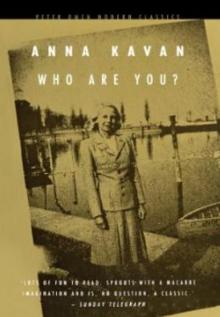 Who Are You?
Who Are You?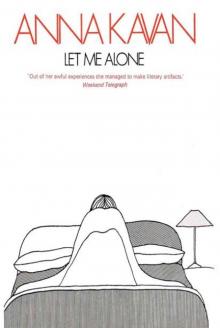 Let Me Alone
Let Me Alone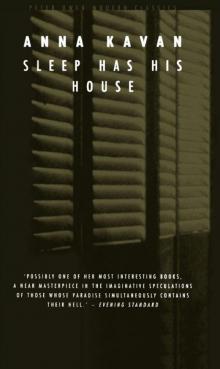 Sleep Has His House
Sleep Has His House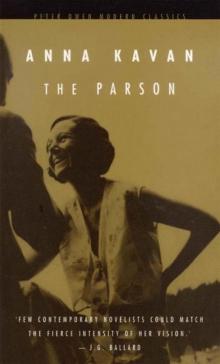 The Parson (Peter Owen Modern Classic)
The Parson (Peter Owen Modern Classic) Guilty: The Lost Classic Novel
Guilty: The Lost Classic Novel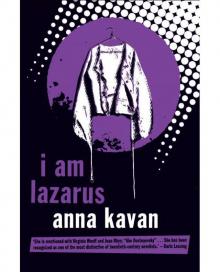 I Am Lazarus (Peter Owen Modern Classic)
I Am Lazarus (Peter Owen Modern Classic)